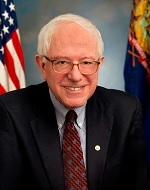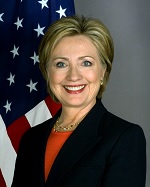With pharma's U.S. pricing power apparently in jeopardy, industry watchers are worried. Just take a look at drug stocks' performance over the past week or so, as a firestorm over an enormous price increase by one drugmaker--Turing Pharmaceuticals--inspired political promises and public rancor.
 |
| Sen. Bernie Sanders |
Proposals to overhaul drug pricing have failed in the past, and industry executives say they're not especially worried that similar measures will succeed this time around. But the danger remains, as long as Sen. Bernie Sanders and Rep. Elijah Cummings keep their Affordable Drugs Act alive in Congress--and beyond that, as long as Sanders or presidential rival Hillary Clinton can keep the issue alive.
So, Evercore ISI analyst Mark Schoenebaum put a pencil to the threat, looking at a range of top drugmakers and their reliance on U.S. government health programs for revenue. Perhaps unsurprisingly, it's not Big Pharma that's most at risk, but specialty drugmakers such as Gilead Sciences ($GILD), with 50% of its sales derived from Medicare or Medicaid coverage. Focused on hepatitis C and HIV drugs, Gilead not only treats diseases common in the Medicaid population, but also relies mostly on the U.S. for revenue.
 |
| Hillary Clinton |
Cancer drugmaker Celgene ($CELG), with 33% of sales in the Medicare and Medicaid arenas, and biotech giant Amgen ($AMGN), at 30%, are both heavily weighted toward U.S. sales as well, and their cancer-focused products are often used by Medicare patients. Amgen's anemia drugs for kidney patients are Medicare meds as well, because Medicare covers care for people with chronic kidney disease.
After that comes Biogen ($BIIB) and Bristol-Myers Squibb ($BMY), with 18% of sales in Medicare and Medicaid patients. Pfizer ($PFE) and Eli Lilly & Co. ($LLY) each count 10% of their sales in those groups, with Merck & Co. ($MRK) and AbbVie ($ABBV) in the single digits, at 4% and 8% respectively.
Schoenebaum is quick to point out that his firm's policy analysts concur with the pharma CEOs who don't expect much success for proposals such as Medicare price negotiation and reimportation of drugs. "[R]egardless of what any Democratic candidate says about drug pricing, his or her ability to make that a reality as president is close to zero," Evercore ISI's Terry Haines said in an investor note, going on to add that even under a Democratic president, "[A] 2017 Congress almost certainly would not approve drug pricing regulation legislation."
That doesn't mean there won't be plenty of talk about it as the campaign season progresses. The latest move by lawmakers, for instance, made big headlines Monday; Democrats on the House Committee on Oversight and Government Reform called on their chairman, Rep. Jason Chaffetz, to issue a subpoena to Valeant Pharmaceuticals ($VRX) about a couple of its large price hikes, and to call CEO J. Michael Pearson to testify at a hearing next week. Rep. Elijah Cummings had already written Chaffetz requesting a hearing, with Turing CEO Martin Shkreli as the star witness.
Special Reports: 10 big brands keep pumping out big bucks, with a little help from price hikes | The top 10 most expensive drugs of 2013